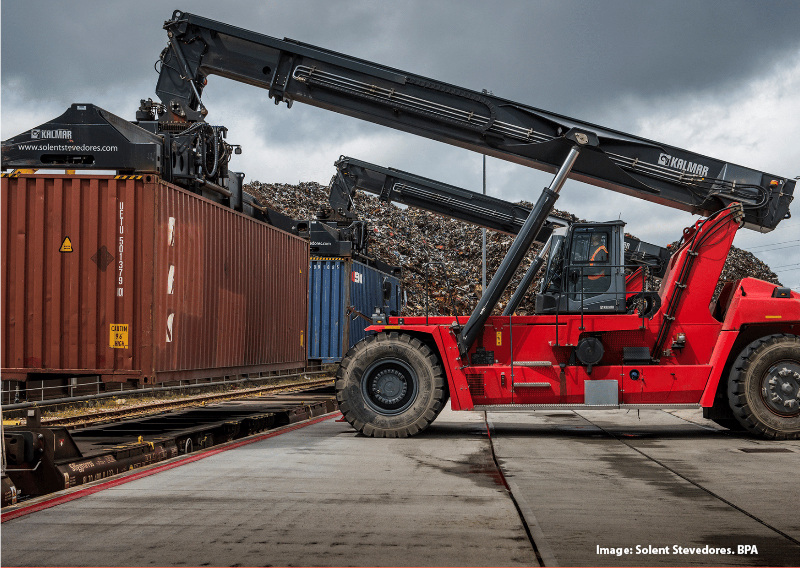The British Ports Association (BPA) says it has published its report on the impact of planned changes to red 'diesel' tax rebates on the ports industry. The BPA estimates that the changes will add additional costs amounting to 3.10% of port turnover when they come into effect in 2022. BPA modelling suggests that an 'average' terminal will be hit with additional fuel costs of nearly £500,000 a year, with bigger operations' costs running into millions.
The Government announced that they would be abolishing rate relief for non-road mobile machinery (NRMM) at the Budget in 2019, however three industries (heating, rail, and farming) would be exempt from the changes due to perceived high impacts from additional costs and impact on modal shift. The BPA hopes this new report will demonstrate similar reasoning applies to the ports sector. It was in response to a new consultation on the impact of the changes, which closed yesterday.
The report argues that:
- Alternatives for most types of port NRMM are extremely limited, particularly at the specifications usually required by port operations
- Where electric alternatives to diesel NRMM are available, it is significantly more expensive, less productive and generally less capable
- Electricity networks do not usually have enough capacity for widespread electrification of port operations. This point was identified in the BPA's recent paper on barriers to shore power. 70% of English ports are in areas where the grid is at or near capacity.
- The additional costs that will result from this change will be met by ports, most likely being passed on in tariff increases and cargo handling charges. Where costs are absorbed this will have a detrimental impact on investment and possibly reverse some efficiencies and improvements made.
- The two year timeline to avoid these costs and invest in electric is not credible, even if there were a viable market for electric NRMM
- Port NRMM is highly specialised and the UK section of this global market is not big enough to drive wider change in the availability of electric machinery
- This may have perverse incentives, making shipping - the most carbon-efficient mode of freight transport - less efficient, driving 'reverse modal shift' and making new low emission diesels coming onto the market less competitive
The BPA is calling on Treasury to reconsider this move, given the impact on a sector that is critical to the UK economy. Specifically, the BPA is asking that:
- Treasury consider delaying this change for the ports industry until at least 2030
- Should this go ahead, low emission diesels are treated differently
- Should this go ahead, a phased approach such as an 'escalator' is used alongside other policy instruments such as a NRMM scrappage scheme
Commenting, Phoebe Warneford-Thomson, Policy & Economic Analyst at the British Ports Association and one of the report authors said:
"Industry and Government have a shared goal in reducing emissions but with no viable alternatives for ports to turn to these changes could actually set us back on that path. Ports will see costs soar from 2022 if Government does not change this policy. BPA modelling indicates that these extra costs will be worth 3.10% of each port’s turnover – leading to less room to investment in the green technologies and perversely increasing emissions through encouraging modal shift from coastal shipping to road transport. We are asking Government to postpone this decision to 2030, at which point they should review the maturity of alternatively powered NRMM markets and determine if viable alternatives are indeed available. At the very least, a phased approach is needed to ensure that ports do not have to deal with cost increases of up to 130% on one of their biggest expenses."
Mark Simmonds, Head of Policy and External Affairs at the BPA said:
"These tax changes are a juggernaut heading towards the ports industry, and not every terminal will have appreciated the impact this could have on their operations. Fuel is already a large expense for port operators and this already acts as a significant incentive to drive efficiencies. Ports have demonstrated that where there are alternatives that can compete with existing gear, investment will follow. This change is a blunt instrument that will hammer the ports industry without driving any change in behaviour - in fact it may reverse some of the good work that has been achieved."
About British Ports Association:
The British Ports Association represents the interests of over 100 port members, covering more than 400 ports, terminal operators and port facilities. The UK ports industry plays a key role in the country’s economy as 95% of the UK’s international trade – imports and exports – is carried through British ports. UK ports also handle more than 60 million international and domestic passenger journeys each year. The UK port industry is the second largest in Europe, handling around 500 million tonnes of freight each year. UK ports directly employ around 115,000 people.




